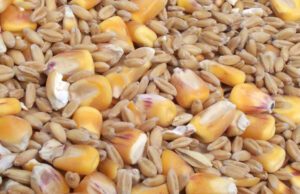
FAO (Food and Agriculture Organization of the United Nations) in November compared to October reduced the forecast of world grain production in 2022 by 4.9 million tons – to 2.764 billion tons, according to the report of the organization.
The new figure is 1.8% lower than last year’s harvest. “The bulk of the revision concerns wheat, but the forecast for global coarse grain production has also been slightly reduced,” the document says. Thus, the wheat harvest estimate is down by 3.4 million tons to 783.8 million tons. However, it is 0.6% higher than in 2021 and is an absolute record.
As the experts explain, the revision of the wheat harvest forecast “is almost entirely due to production indicators in the U.S. – a decrease in yields and the reduction of harvesting areas. Forecasts for other producing countries, where the harvest is coming to an end, have not changed.
Forage grain harvest estimates are down 1.3 million tons to 1.467 billion tons. That’s down 2.8 percent from last year. “This is the first decline in production in four years,” the report notes. Most of this month’s decline in the forecast is due to lower corn production estimates in the U.S. and the EU, where recent data show the effects of the drought were more widespread than previously thought. Ukraine’s corn production forecast has been raised.
According to the report, corn acreage will remain planted in 2023, “but further expansion may be constrained by high production costs.”

The Cabinet of Ministers of Ukraine has agreed on the signing of an agreement between the government of the country and the Food and Agriculture Organization of the United Nations (FAO) on the establishment of a project office in the country to provide it with technical and humanitarian assistance in the face of Russian military aggression.
As reported on the website of the Ministry of Economy of Ukraine on Tuesday, the Cabinet of Ministers on September 27 authorized First Vice Prime Minister – Minister of Economy Yulia Sviridenko to sign this agreement.
“Ukraine has long and fruitfully cooperated with the FAO, an organization whose mission is to fight hunger around the world. Our state has been and remains the breadbasket of Europe and the world, but because of the war unleashed by Russia, we already need help. FAO provides it, in in particular, by implementing jointly with the governments of the partner countries programs to support Ukrainian farmers,” Sviridenko was quoted as saying by the ministry.
It is specified that with the start of a full-scale invasion of the Russian Federation into Ukraine, FAO has updated a rapid response plan to help Ukrainian small and medium-sized farmers and agricultural producers. As of mid-August, the organization provided emergency assistance in the form of seed material and cash for 80,000 people in 13 regions of Ukraine.
In addition, FAO and the Government of Ukraine, with the financial support of Japan and Canada, are implementing projects to restore grain storage capacities in the warring country, which provide for the supply of equipment for loading and unloading grain, modular storage containers, etc. to Ukrainian farmers from 10 regions.
According to the Ministry of Economy, the implementation of a rapid response plan and a strategy to increase grain storage capacity in Ukraine will cost FAO and its partners a total of $180.4 million.
“The adoption of the Agreement and the creation of an FAO office in Ukraine will allow raising cooperation to a higher level … We expect closer coordination in matters of grain exports. Ukraine will continue to help countries where the issue of food is acute. In the future, cooperation will contribute to the growth of Ukrainian exports and the achievement of our the goal is to create an export-oriented economy with high added value,” Sviridenko summed up in the message of the Ministry of Economy.
FAO is a UN agency dedicated to ensuring world food security, improving nutrition and living standards in its member countries. The organization consists of 194 countries, Ukraine joined it in 2003.
FAO, food organization, KYIV, OFFICE, UN

Pork consumption by Ukrainians in 2021 will grow by 4.7% compared to 2020, to 15.5 kg per person per year (excluding fat and offal), which will be the highest result since 2013, when this indicator per capita was 17.9 kg.
This opinion was published on the website of the Association of Pig Breeders of Ukraine with reference to data from the UN Food and Agriculture Organization (FAO).
“The increase in pork consumption is determined by several factors, including the growth of domestic production. Pork occupies niches that free up other types of meat, primarily chicken. So, in 2021, the consumption of chicken will decrease by almost 2 kg,” FAO agricultural markets expert Oleksandr Sikachyna quoted in the post.
According to him, the elasticity of demand for meat is slow: consumers need time to change their purchasing habits, so consumption will not be able to quickly respond to high rates of production growth.

The Food and Agriculture Organization of the United Nations (FAO) predicts that grain harvest in Ukraine in 2019 will be 65.3 million tonnes, which is 5.6% lower than in 2018.
According to the May report, FAO forecasts an increase in wheat production in Ukraine in 2019 by 7.7%, to 26.5 million tonnes and a decrease in corn production by 19%, to 29 million tonnes.
Wheat exports in 2019/20 agricultural year (July-June) will decrease compared to the previous agri-year 0.3%, to 17 million tonnes, corn by 1.2%, to 21 million tonnes, and barley by 0.3%, 4.2 million tonnes.
According to the Ministry of Agricultural Policy and Food, Ukraine since the beginning of the 2018/2019 agri-year as of May 13, 2019 exported 43.77 million tonnes of grain and leguminous plants, which is 24.5% more than on the same date of the previous agri-year.
Grain exports in 2018/2019 agri-year, according to the estimates of the ministry, are projected to be 49 million tonnes.